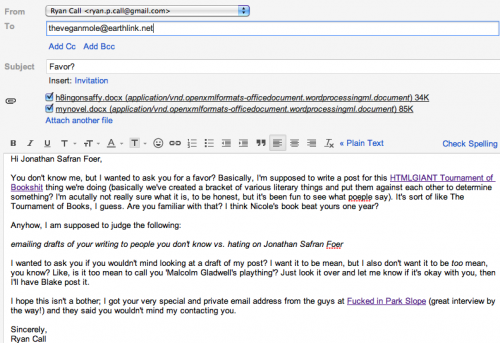What we talk about when we talk about the New Sincerity, part 2

"Hi, How Are You?" cover art by Daniel Johnston (1983); "financially desperate tree doing a 'quadruple kickflip' off a cliff into a 5000+ foot gorge to retain its nike, fritos, and redbull sponsorships " by Tao Lin (2010)
It made me very happy to read the various responses to Part 1, posted last Monday. Today I want to continue this brief digression into asking what, if anything, the New Sincerity was, as well as what, if anything, it currently is. (Next Monday I’ll return to reading Viktor Shklovsky’s Theory of Prose and applying it to contemporary writing.)
Last time I talked about 2005–8, but what was the New Sincerity before Massey/Robinson/Mister? (And does that matter?) Others have pointed out that something much like the movement can be traced back to David Foster Wallace’s 1993 Review of Contemporary Fiction essay “E Unibus Pluram: Television and U.S. Fiction” (here’s a PDF copy). I can recall conversations, 2000–3, with classmates at ISU (where DFW taught and a number of us worked for RCF/Dalkey) about “the death of irony” and “the death of Postmodernism” and a possible “return to sincerity.” Today, even the Wikipedia article on the NS also makes that connection:
ToBS R3: Daily facebook updates of what you ate while writing today v hating on Jonathan Safran-Foer

[matchup #54 in Tournament of Bookshit]
Last night I had a dream that I was talking to a really attractive girl at a bar in an airport. We were having a great conversation, and I felt really good. Somehow I had already seen the movie version of whatever J.S. Foer’s novel is called, and somehow this came up as a topic of conversation. I laughed to myself and said, “You know what? I liked that movie. I really enjoyed watching it.”
The girl stared at me and said “why are you laughing?”
I said, “You know… because it’s that novel… by that guy.” READ MORE >
ToBS R1: hating on Jonathan Franzen vs. hating on Jonathan Safran Foer

[Matchup #16 in Tournament of Bookshit]
You meet a woman and wake up to her bookshelf:
• 30-50 copies of Elle
• 1984
• [something by Chuck Klosterman]
• Everything Is Illuminated
You say, “Okay,” to her while she sleeps. READ MORE >
Tree of Codes
 Tree of Codes
Tree of Codes
by Jonathan Safran Foer
Visual Editions, 2010
285 pages / $40.00 Buy from Powell’s
Rating: [ ].5
Note: This review was written by excising words from Michael Faber’s review of Tree of Codes in The Guardian.
[] [ ] [ ] all-time favourite [ ] [ ] [ ] [ ] Cinnamon [ ], retitled [ ] [ ] [] [ ] [ ] [ ] [ ] translated [ ] [ ] [ ] [ ] [ ] . [ ] [ ] [ ] [ ] passive [ ] [ ] vanity [ ] , [ ] [ ] [ ] [ ] [ ] [ ] [ ] [ ] [ ] [ ] compulsion [ ] [ ] [ ] [ ] [ ]. [ ] [ ] [ ] [ ] love [ ] [ ]? [ ] [ ] [ ] [ ] [ ] [ ] [ ] [ ] [ ] No, [ ] [ ] already done [ ] [ ] [ ] [ ] [ ] [] [ ] [ ] [ ] [ ] [ ] [ ] [] sadly [ ] here. So, [ ] [ ] [ ] [ ] [ ] [ ] [ ] [ ] [ ]fresh [ ]? [ ] [ ] [ ] [ ] [ ] [ ] [ ] dream [ ] mutterings faithfulness [ ] bankroll [ ]?
September 22nd, 2011 / 12:06 pm
Montevidayo Foerversy Dear

1. If you haven’t been following the discussions at Montevidayo, a new group blog run by Johannes Göransson, you should start now. Recent posts include Joyelle McSweeney on the Bourne Identity, Johannes on atrocity kitsch, and at least 3 posts on the mechanics of Shutter Island.
2. @ The Awl, an interesting allegation made in finding similarity between Jessica Soffer’s story “Beginning, End” from Granta and Jonathan Safran Foer’s recent publication in the NYer, “Here We Aren’t, So Quickly.” Apparently Soffer was a student of Foer’s wife Nicole Krauss, and the similarity between the stories is mmm. I personally don’t give a crap about stealing, or allegations thereof, because I think all words are words, but still, take a whoop.
3. A friend of mine compared the new Matthew Dear album, Black City, to a Talking Heads for the 00s. He may be on to something.
Alternative Magazine Covers
As Jonathan Franzen solemnly graces the cover of TIME magazine, we got to thinking who of his peers were also deserving of a cover on other magazines, and what those magazines might be. Here are our top picks:
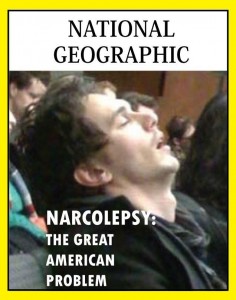
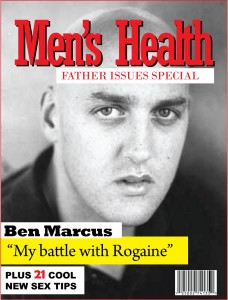


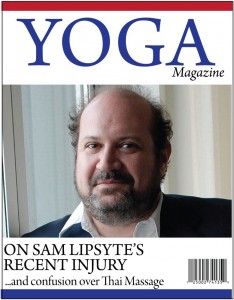

August 17th, 2010 / 4:17 pm
Some Jews are OK?
Thanks to Tony O’Neill for the tip off: christwire.org calls Jonathan Safran Foer “A Jewish Star Christians Really Can Follow!”.
Some direct quotes from the article:
John Updike crowned Foer the genius voice of his generation, but sadly, the rest of that generation was off growing goatees and clicking around MySpace.
His soaring words put cruel and negative Jewish writers like Gary Shteyngart, Sam Lipsyte and Michael Chabon to shame. All they write about is chasing homely girls and how they lack the jocky virility to open a mayonnaise jar. Pathetic!

Snap! Take that Lipsyte, ya hack!
Literary Doppelgangers: Jonathan Safran Foer and Brian Chase
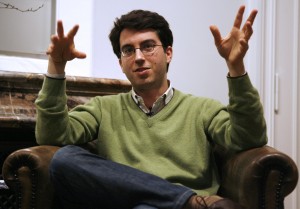

James Scott points out this doppelganger: Jonathan Safran Foer and Brian Chase, drummer for the Yeah Yeah Yeahs.
What do you think?
Seems like there’s a missing mole in there somewhere.

